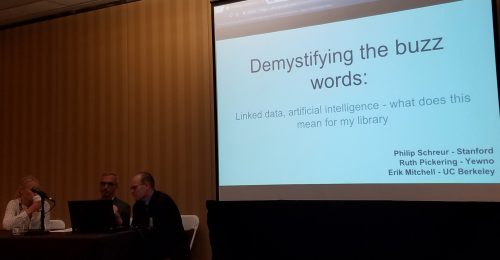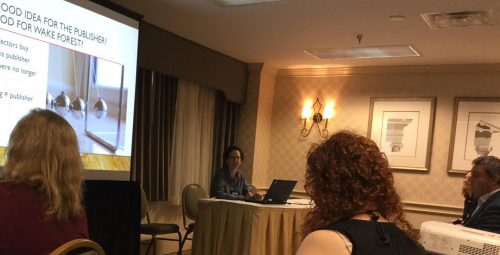This article is more than 5 years old.
Theme 1: Books
Arizona State will soon close its main library for two years for a massive renovation. During this time, practically all of their books will be in storage. Once they’re done, they can put about 375K books in open stacks while most of the rest of their 4 million books will remain in storage. Which books are important enough to have in front of the browsing public?
Repeatedly the presenters mentioned that they will not necessarily use LC A-Z order. Are the cool kids abandoning the dream of A-Z order just as we’re on the cusp of achieving it? (I was also a little skeptical. Although information needs may be topical when someone approaches a discovery system, by the time they want an actual book most needs are known item. If you’re constantly rearranging your books, how will your most dedicated readers find known books? I was next in line to ask these very questions when time ran out. Shucks.) Their white paper is posted online – pages 23-26 were particularly interesting. I suggest that Access and Outreach folks take a look. I also signed up to participate in ongoing discussions.
Another idea from this session: They recommended taking ideas from retail, and we have a Center for Retail Innovation right here on campus. Can we have someone from CRI speak to us?
I also attended two talks from Brewster Kahle of the Internet Archive. These talks focused on their book project (Open Library) and their efforts to expand access to 20th century in-copyright works. They are another place to send deaccessioned books. They will pay for shipping if the book isn’t in their collection yet. Since the Charleston audience is predominantly academic libraries and publishers, I hope his message is also reaching public libraries that are withdrawing popular 20th century works en masse.
Theme 2: Discovery Systems
I particularly tuned into sessions about discovery system usability, since that’s an emphasis for the UX Committee this year. The bento box approach was hailed in two separate presentations as The Solution to our current discovery ills. (Also – blast from the past #1 – a presenter used the term “pathfinder” to refer to LibGuides and their equivalents.) One of the discovery panels put their slides online – a recommended read for my UX compatriots.
Blast from the past #2: I saw Erik Mitchell, formerly of ZSR, in a presentation on three different ways to enhance discovery. Erik’s part was Share-VDE, which is based on linked data and BIBFRAME. A Yewno co-founder was also there. She emphasized that her product is best at exploring topics, and is not as good at known item searching. At least twice, she mentioned being overwhelmed with results when you use traditional discovery. Several in the audience wondered how to appropriately steer patrons to Yewno vs. a standard discovery tool vs. a subject-specific database. For myself I wondered if the Yewno approach would be awesome or horrible for my translation and interpreting students. Their problem is not an overwhelming amount of information, but an overwhelming amount of false hits with a few nuggets of relevance sprinkled in. Can their AI-informed graphs easily distinguish between interpreting the law (what does the law really mean?) and interpreting foreign-language court testimony into English?

In a single photo, I establish both that I saw Erik and that I actually attended a program on linked data.
Also Interesting
Anyone else aware that “We Shall Overcome” was at the center of a copyright lawsuit? Read more here. Most interesting to me as an amateur linguist was that a lyrics change from “will” to “shall” was not deemed important enough to make a new copyright-able derivative work. So the first verse is now officially public domain.
Oh yeah, I also did a shotgun session myself, which I’ll probably reprise at a future liaison circle meeting. And I (along with Steve C. and Christian) dined with Derrik and Rachel Hiatt (blast from the past #3). Erik, Derrik and Rachel all say hi.

A poorly-lit me delivers my Shotgun Session.

7 Comments on ‘Carol in Charleston 2017’
I would be curious if libraries that have put a large portion of their books in storage/a BookBot see a decrease in circulation?
Thanks, Carol! Even though I didn’t go to the conference, I enjoyed getting to see your presentation during your prep in ZSR!
Lots of interesting information here, thanks Carol!
It will be interesting to see how Arizona State handles closing their building for 2 years. Thanks for the thorough report and the Erik/Derrick sightings!
I’m thinking that only Erik could have drawn you to a linked data session! Thanks for the good info and links to follow.
[…] Long Arm of the Law.” Carol touched on the “We Shall Overcome” portion this session in her post, and it was interesting to note some of the recent cases that could have an impact on libraries and […]
I don’t think I’ve ever gotten an assignment through a blog post before. Thanks for the great insights, Carol!